
Smoking
Doctors cite quitting smoking as the single healthiest thing you can do for yourself. Cigarettes are responsible for more than 480,000 deaths every year in the United States, making smoking the leading preventable cause of death. Tobacco makes the risk of lung cancer and heart attack soar, but that’s only the beginning. “Smoking is the most destructive habit when it comes to lung health,” says geriatrician Robert Stall, MD, of Buffalo, New York. “It triggers conditions like emphysema and chronic obstructive pulmonary disease [COPD], where you’re literally suffocating. It’s as if you’re holding your nostrils shut so that you can barely get any air through, and breathing that way every moment of every day. It’s torturous.”

Breathing secondhand smoke regularly
There’s a more selfish reason to convince your partner to kick a smoking habit: They aren’t the only one breathing in the toxic chemicals from cigarettes. About 41,000 adult nonsmokers died each year from heart disease and lung cancer triggered by secondhand smoke between 2005 and 2009, according to the CDC. Plus, kids could get bronchitis, ear infections, more (and more severe) asthma attacks, and more from breathing in secondhand smoke. These are 50 secrets hospitals don’t want you to know.

Not having a regular exercise routine
Exercise is incredibly important for your health, but not for the reason you think. “Exercise is excellent for a million different reasons, but it is not the greatest when it comes to weight loss,” says Albert Ahn, MD, clinical instructor of internal medicine at NYU Langone Health. “Weight loss is mainly dependent on diet.” But exercise does help your heart, sleep, mental health, joints, and more, he says, so aim to get 30 to 40 minutes of activity every day.

Failing to deal with stress
Stress isn’t just bad for your mental health—it takes a toll on your physical health, too. Being in constant “fight or flight” mode makes it hard to make good decisions, meaning you could start eating an unhealthy diet, skipping the gym, and skimping on sleep. All of those lead to weight gain and high blood pressure, upping your risk of heart disease and other serious health issues. The constant firing of stress hormones also weakens your immune system, making it hard to kick any disease. Of course, nixing stress from your life is easier said than done. “Everyone has stressors,” says Dr. Ahn. “Some of it is how we cope with the stress. Obviously, there are healthier ways and less healthy ways.” Instead of escaping a long week with a bottle of wine, schedule regular workouts, which can beat stress and boost your health overall. Don’t miss these 60 secrets the emergency room staff won’t tell you.
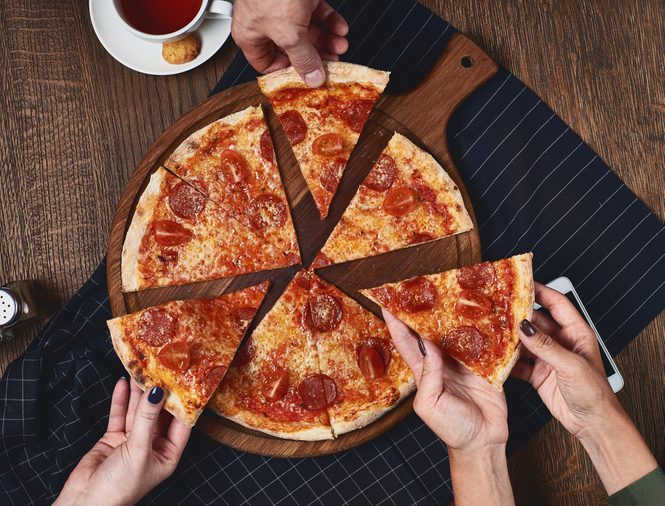
Eating for your emotions
One stress-buster that doctors don’t recommend: comfort food. “One of the worst things you can do is emotional eating, whether you’re angry or stressed or bored,” says Brunilda Nazario, MD, associate medical director and lead medical editor at WebMD. The more you eat for your emotions rather than your hunger, the more likely you are to overeat and gain weight. As a rule of thumb, don’t eat if you aren’t hungry. Instead, find a healthier outlet, like deep breathing or taking a walk to clear your head, says Dr. Nazario. Be especially careful to avoid the 13 foods heart doctors try to never eat.
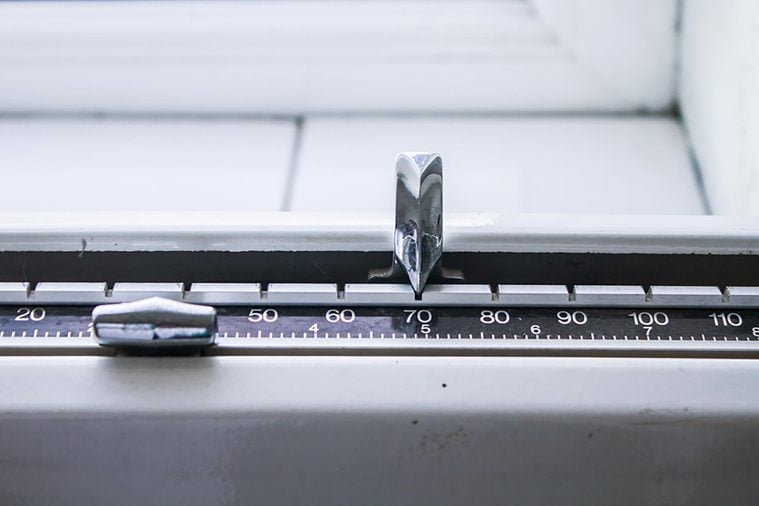
Yo-yo dieting
You’d think keeping those ten pounds off temporarily is better than nothing, but constantly losing and regaining weight offers its own health problems. A study in the New England Journal of Medicine found that among people with heart disease, those with the biggest weight fluctuations had double the risk of heart attack, stroke, and death. Doctors suspect yo-yo dieting could increase the stress hormone cortisol, in turn upping the risk of heart attack. Don’t be discouraged from losing weight, but be sure to focus just as much on maintaining a healthy weight as you did dropping those pounds to start. These are common mistakes that make you keep regaining weight.

Putting off bedtime
While you shouldn’t stress over one sleepless night, regularly skimping on sleep over a course of months or years can affect your wellbeing. Studies have shown a lack of sleep can hurt mental sharpness, spark junk food cravings, increase the risk of heart disease, and more. “You’ve got to give your body time to rest, time to regenerate itself,” Dr. Ahn says. While not everyone needs the oft-cited full eight hours, most people need at least six to eight hours, he says.

Relying on sleeping pills
For anyone who has trouble getting enough shut-eye at night, sleeping pills seem like the perfect answer to getting more of that healthy sleep. While they’re fine for short-term sleep issues, though, it’s a bad idea to rely on them in the long term. Your body can get hooked, meaning you’ll have an even harder time getting to sleep without medication than before, and you’ll need a bigger dose to send you to dreamland. Talk to your doctor about how to safely use sleeping pills, and try these 13 sleep tips for when you have insomnia.

Not addressing debt
Financial debt doesn’t just take a toll on your bank account—it has health consequences, too. A study of 8,400 young adults found that regardless of socioeconomic status, higher debt was linked to higher stress, depression, and diastolic blood pressure, plus worse general health.

Forgetting to drink water
Hydration probably isn’t as front-of-mind as, say, what you’ll eat for lunch, but water shouldn’t be an afterthought. “Most of us stay a bit dehydrated until we’re so dry that we reach for water,” says Dr. Nazario. “It’s important to stay in front of that thirst.” Without enough H2O, you will likely end up eating more (and then gaining weight), plus end up with brain fog.
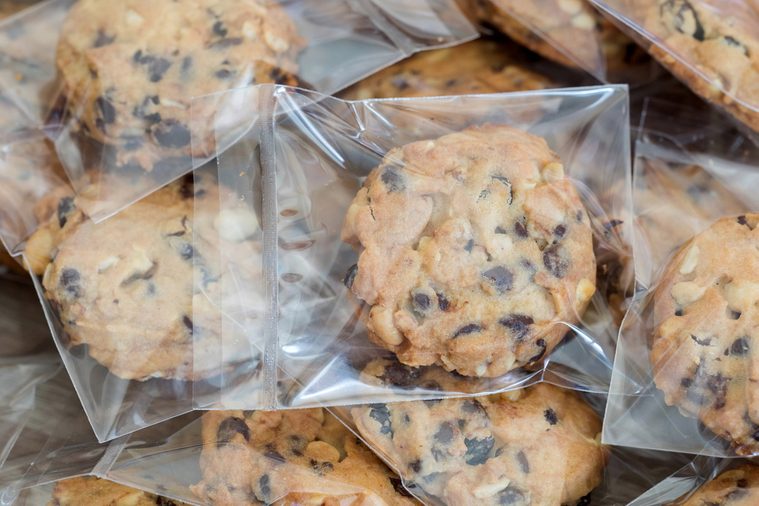
Choosing a diet of processed foods
Passing on chips and fast food seems like enough of a no-brainer, but Dr. Ahn says he tells his patients to cut down on all processed food, including white bread and refined sugars like high-fructose corn syrup. The body breaks down refined sugars faster than it would natural sugars, like in fruit, meaning you’ll get hungry quicker, regardless of how many calories you scarfed down. While a busy lifestyle often means relying on some shortcuts, like canned foods or takeout meals, he suggests scanning nutrition labels, aiming to find as many whole foods as possible. “The more ingredients there are listed, the less likely it is to be helpful for you,” he says. But don’t worry about following the 20 worst pieces of health advice you still see all over the Internet.

Choosing soda over water
Your waistline isn’t the only thing at risk. Drinking even one soda every day is linked with a higher risk of type 2 diabetes, heart attack, and gout. And switching to diet might not ease the blow. Studies have linked a daily diet soda habit with diabetes, heart attack, stroke, and even obesity. It’s impossible to know for sure whether the soda was the direct cause, but there’s no harm in switching from sugar- or artificially-sweetened drinks to unsweetened. Make sure you know these 21 bad habits giving you more belly fat.
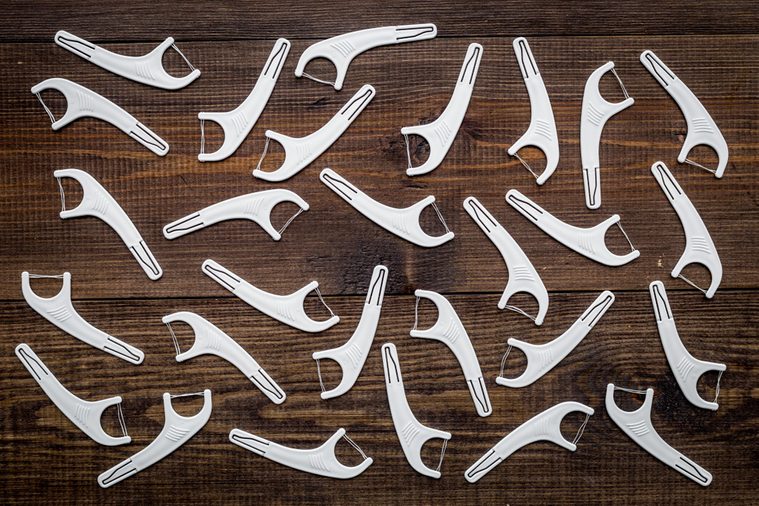
Skipping flossing
Despite recent reports that evidence doesn’t prove flossing does much good, dentists still strongly urge patients to keep up with the habit. “Every dentist in the country can look in someone’s mouth and tell whether or not they floss,” dental expert Tim Iafolla, DMD, tells the National Institutes of Health. It’s hard for long-term, large-scale studies to find any connections because people often claim they have better health practices than they do, but smaller clinical studies have shown flossing does indeed protect against mild gum disease. Quit these other 30 everyday mistakes that ruin your teeth.

Drinking to excess on a weekly basis
Heavy drinking means having more than eight drinks per week as a woman, or 15 as a man, according to the CDC. But it’s not just the fear of bad decisions, like drunk driving or falling. Over time, excessive drinking can head to heart problems, liver disease, dementia, and certain cancers. Stick to a moderate amount: For women, that means one drink per day, and for men, it means up to two.
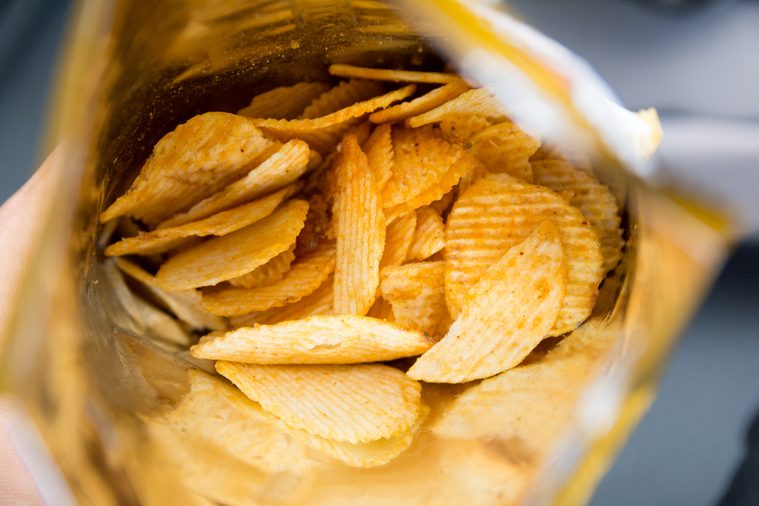
Eating mindlessly
If you’re gobbling down food in front of the TV or while on the go, you aren’t focusing on what you’re putting in your body. “You’re unaware of what you’ve eaten,” says Dr. Nazario. “You might have satisfied the calories, but you haven’t satisfied what you’re looking for.” Without paying attention to what’s going in your body, it’s easy to steamroll past hunger cues and eat twice as much as you meant to, because your mind hasn’t called out a good stopping point. Be mindful when you’re eating, suggests Dr. Nazario, paying attention to whether you’re actually hungry or just eating food because it’s there. Watch out for these other food mistakes even healthy people make.
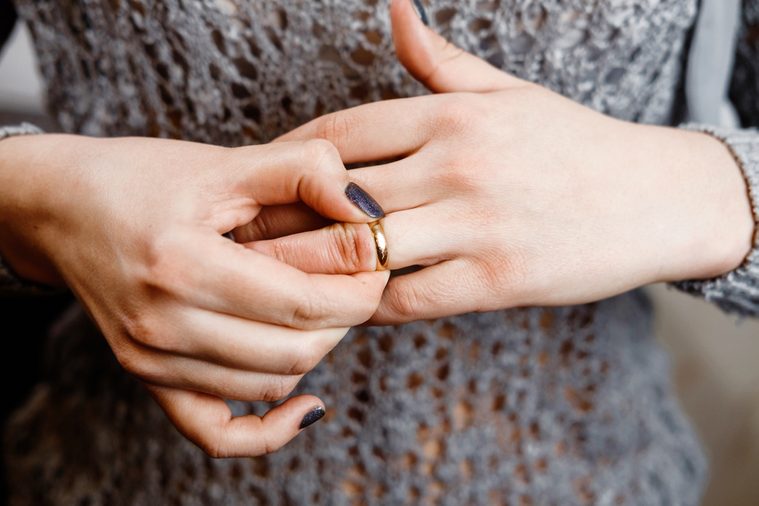
Staying in an unhappy relationship
Relationship troubles can cause stress that reflects back on your general wellbeing, but that’s not all. One study in the journal Health Psychology found that the happiness of a person’s partner was even better at predicting the person’s good health than the participant’s own happiness was. Other research found that good relationships have mental health benefits. If your relationship is doing more harm than good, take a closer look at whether it’s worth the pain. Check out these other 75 secrets a nurse won’t tell you.